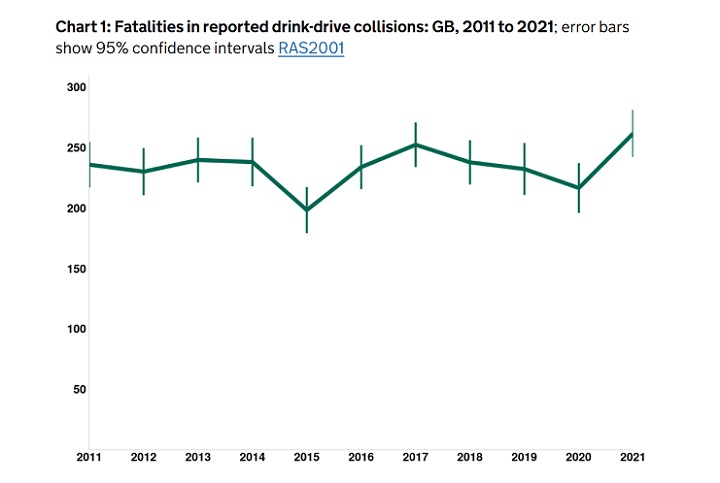
New figures show the number of people killed in drink-drive collisions in 2021 reached a 12-year high.
Published by the DfT today (27 July), the data shows that between 240 and 280 people were killed in drink-drive collisions in 2021, with a central estimate of 260 fatalities.
The estimate is the highest since 2009 and represents a statistically significant increase from 2020.
Meanwhile, the central estimate of the number of killed or seriously injured drink-drive casualties in 2021 is 1,880, an increase of 23% on 2020.
An estimated 6,740 people were killed or injured in drink-drive collisions, an increase of 4% from 2020.
The DfT says the number of reported drink-drive collisions – and casualties involved in them – are likely to have been impacted by the COVID-19 pandemic in recent years.
Breathalyser firm Alcosense has described the data as “very concerning”.
Hunter Abbott, MD of AlcoSense, said: “It’s very concerning indeed to see the number of fatalities caused by a drunk driver increase by nearly a fifth.
“Although we spent much of 2020 in lockdown, resulting in less traffic on the roads, restrictions were also in place for the first half of 2021 so again there were fewer vehicle movements than usual.
“We haven’t seen this many drink drive deaths for 12 years.
“What these figures don’t tell you, of course, is how many more casualties were caused by ‘lethal but legal’ drivers – those who were above the point of intoxication where effects on cognitive function occur, but below the official drink drive limit.”
Meanwhile, the RAC says the figures should provide “a wake up call”.
Simon Williams, RAC road safety spokesman, said: “These figures are extremely worrying and demonstrate that the battle against drink-driving is far from over.
“This should be a wake-up call to both the Government and police forces about the need for effective enforcement, including increased roadside breathalysing. Our message to drivers is simple yet stark: drink-driving ruins lives.”
IAM RoadSmart is calling on the Government to tackle the “real problem areas”.
Antony Kildare, CEO at IAM RoadSmart, said: “We urge the Government to put resources into tackling the real problem areas when it comes to drink-driving – young drivers, those with challenging behaviours around alcohol, and those who simply don’t believe they will ever get caught.
“The best way to catch those who ignore the limit is through intelligence-led high profile policing so investment in roads policing must be protected. The reality of being caught must be matched in education campaign messaging.
“It must not be forgotten that drivers who take a drink-drive rehabilitation course are less likely to reoffend. Currently a convicted drink-driver has to choose to take a course when they appear in court. At IAM RoadSmart we believe a more effective option would be to make the course compulsory and force drivers to opt out only if they choose to do so.”
Who’s to say that enforcement isn’t effective? Perhaps it’s done all it can do, and we ought to be looking at other measures. After all, excessive drinking is a health problem, isn’t it?
I’m not sure whether the MD of Alcosense or the RAC are the best people to comment on the matter.
Something rather more thoughtful can be found here:
https://ahauk.org/mental-health-problems-in-drink-driving/
… and the concluding phrase is surely salient – “The criminal justice system in the UK needs closer links with treatment, support and recovery services, to enable people to recover and avoid further drink-driving.”
In my experience, however, the criminal justice system doesn’t listen to anyone. (But that’s another sad story.)
Fraser Andrew, STIRLING
+1